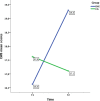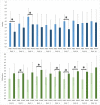Promoting Emotional Well-Being in Older Breast Cancer Patients: Results From an eHealth Intervention
- PMID: 30538650
- PMCID: PMC6277478
- DOI: 10.3389/fpsyg.2018.02279
Promoting Emotional Well-Being in Older Breast Cancer Patients: Results From an eHealth Intervention
Abstract
Breast cancer is the most common cancer in women worldwide, with increases in diagnoses at all ages. Due to several age-related factors, older breast cancer patients show particular difficulties in adjusting to breast cancer and its related treatments. One consistent indicator of vulnerability to long-term complications is emotional distress occurring within 3 months of diagnosis. Thus, it is critical to develop early interventions specifically aimed at mitigating distress and promoting emotional wellbeing in older breast cancer patients. By taking advantage of the opportunities of online interventions, the present study aimed to test the efficacy of a 2 weeks e-health stress inoculation training (SIT) intervention on emotion regulation and cancer-related well-being, compared with a control group without such intervention. Twenty-nine women with a diagnosis of breast cancer, who had received radical surgery and who were suitable candidates for adjuvant chemotherapy with anthracyclines and taxanes (mean age = 62.76; SD = 6.19) voluntarily took part in the current study after giving written informed consent. To test intervention efficacy, self-report questionnaires were administered to all participants at baseline, at the end of the 2 weeks intervention, and 3 months after the end of the intervention. Results showed that after 2 weeks of ehealth intervention, patients did not achieve significant change, however, they significantly reduced emotional suppression and increased cancer-related emotional well-being 3 months after the end of the intervention. Furthermore, by monitoring at a distance the emotional experience during the online intervention, we found an increase in relaxation and a reduction of anxiety. Finally, patients in the experimental group reported a good level of acceptance of the ehealth intervention. To conclude, designing and developing eHealth interventions as part of the regular care path for breast cancer patients of all ages represents both a challenge and an opportunity; in particular, online interventions can be an important step in universal psychosocial care within a tiered model of care.
Keywords: breast cancer; eHealth; emotion regulaton; positive technology; well-being.
Figures





References
-
- Amiri M., Aghaei A., Farahani A., Abedi A. (2017). The effect of stress inoculation training (SIT) on social dysfunction symptoms in diabetic patients. Iran. J. Posit. Psychol. 3 74–82.
-
- Balzarotti S., John O. P., Gross J. J. (2010). An Italian adaptation of the emotion regulation questionnaire. Eur. J. Psychol. Assess. 26 61–67. 10.1027/1015-5759/a000009 - DOI
LinkOut - more resources
Full Text Sources

